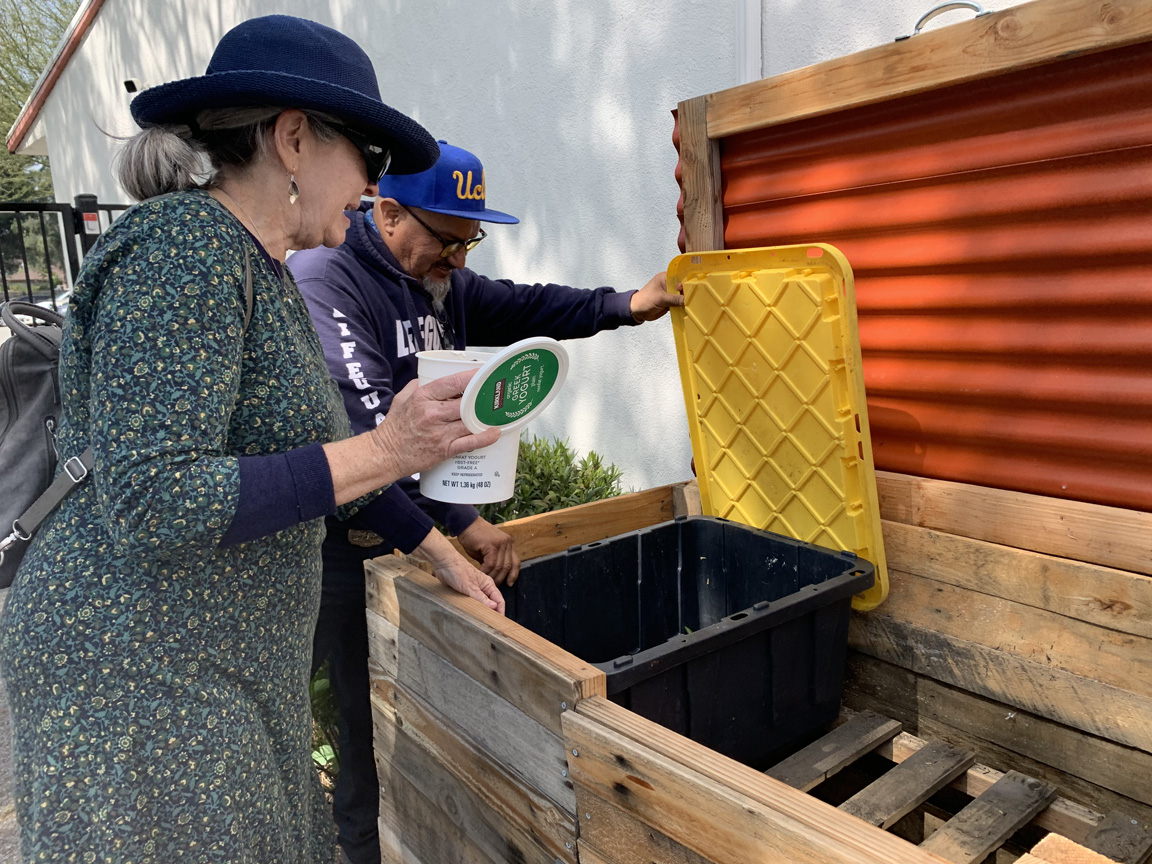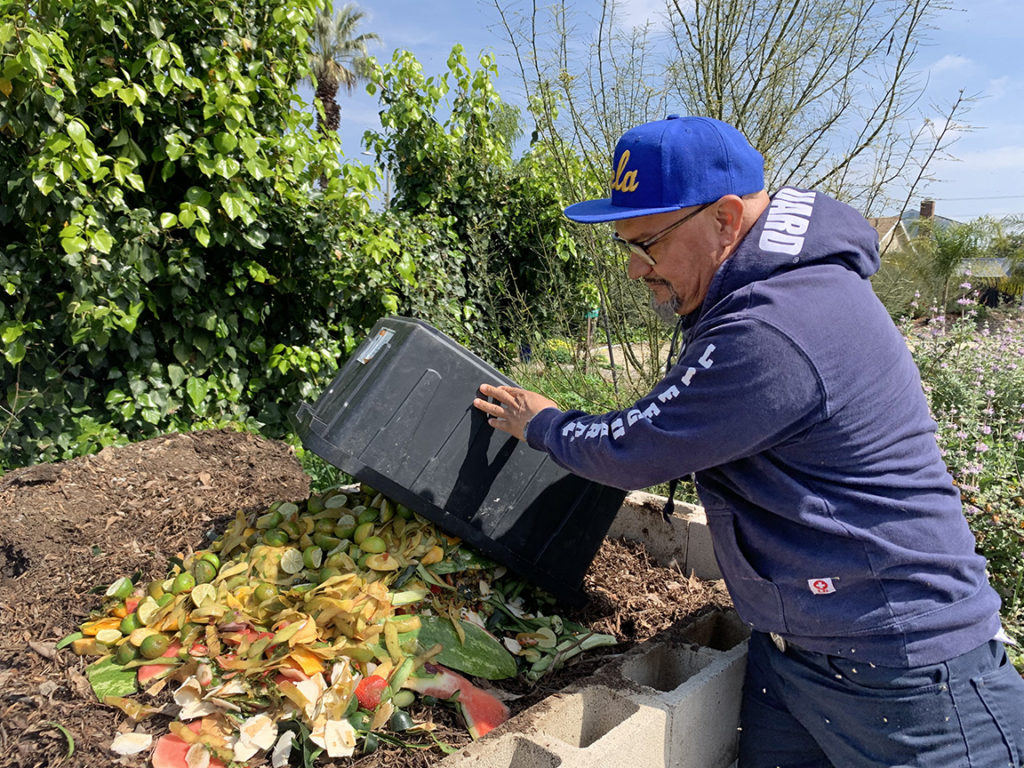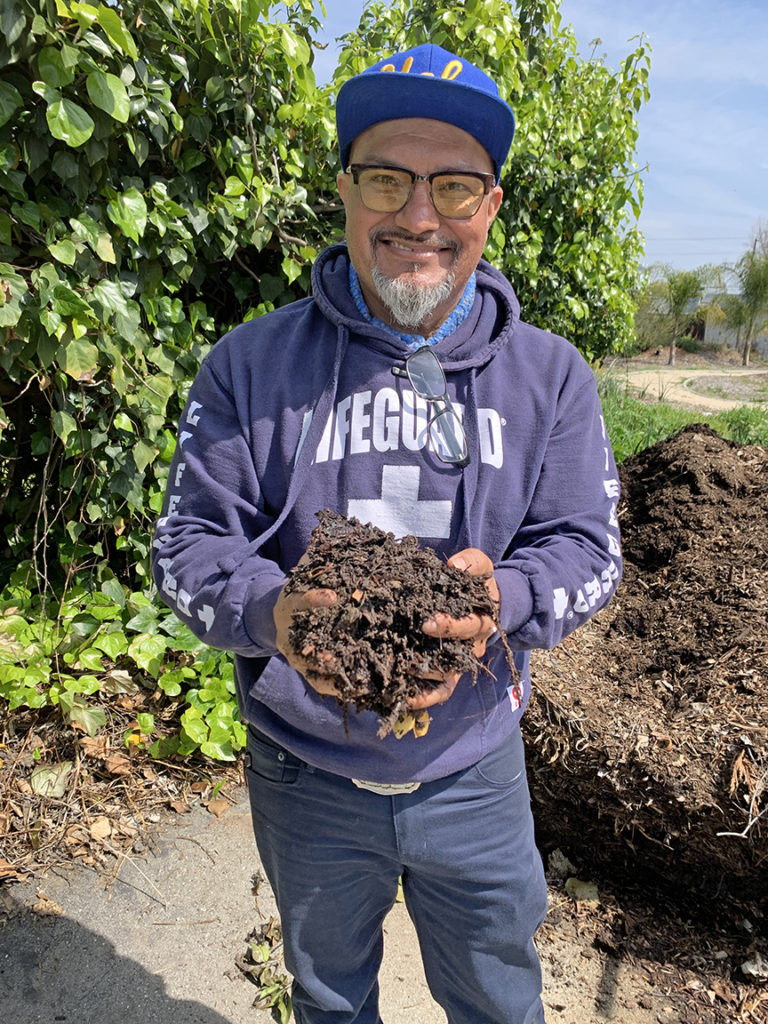
Cisco Cruz assists parishioner Lydia Henry as she drops off table scraps in the community recycle bin in the parking lot at Christ Episcopal Church, Ontario. Photo: Pat McCaughan
[The Episcopal News] For Francisco “Cisco” Cruz, compost has brought new life – and lots of it.
As a traumatic brain injury (TBI) survivor, Cruz, 54, sees striking similarities between leftover food scraps recycled into rich nutrients for growth and health and his own journey to wellness. A concrete journeyman with his own business creating outdoor kitchens and landscapes, his life changed forever in 2010 when a falling wooden beam struck his head and sidelined him.
Few, if any, resources were available for support. For Cruz, unable to work, each day was an unpredictable emotional roller coaster. He searched, sometimes unsuccessfully, for words. “I started losing my strength to be able to carry a shovel. I didn’t have the same energy I used to have, and it would go away suddenly,” he recalls. His marriage ended. He lived in his truck for several years. The headaches lingered. He considered suicide.
But a visit to Rebecca’s Garden, at Christ Episcopal Church in Ontario, dedicated in memory of the congregation’s former organist Rebecca Rollins, sparked a new spirit in him. “I started seeing, more and more, the beauty of the people’s hearts there, and it was appealing for me,” he recalled.

Cisco Cruz adds food scraps to the compost pile. He layers the leftovers with dried leaves and manure in the “lasagne” technique, creating a nutrient-rich soil. Photo: Pat McCaughan
“I started going on Sundays. I had my community, and I felt right at home, I felt safe, and I realized what Episcopalians were all about; it’s about helping community, about helping others.”
Now, almost a year later, he is director of the Community Compost Project at the church, and earlier this year hosted a group from the U.S. Composting Council’s international conference on industrial scale composting. He also facilities student visits from local schools and colleges and has visions of going door-to-door with small plastic bags of the fertile compost, and this message: “This is what you will get if you give me your leftovers.”
Creating neighborhood networks, he staffs a booth at the local farmer’s market and makes frequent trips to the nearby La Michoacana Restaurant, where employees save zucchini, cucumber, and fruit leftovers for his pick-ups. He dumps several boxes of food scraps from the bed of his pickup truck onto a landfill of dried leaves, followed by manure, as part of a layered “lasagna” approach to composting.
“He’s brought life back into the church” with a TBI support group he created and leads on Tuesday mornings, says Mary Roberts, director of Rebecca’s Garden. Group members “come into the garden and say, ‘what’s this?’ It’s wonderful and now people from the TBI group are coming to the church.”
Cruz is a teacher, says Lydia Henry, a parishioner who has come to drop off some of her own table scraps in the community bin located in the church parking lot.
TBI “is more than a support group,” Henry says. “It’s a resource center. Cisco is networking and using resources and people come in and share things that have worked for them with their healing. They are very open to try new things.”
At a recent TBI meeting, Eduardo, 31, waves his right arm above his head and chair-dances in joyful celebration, as other members of the group cheer and applaud him.
The simple gesture was something doctors told his mother, Teresa, he could never again accomplish after a high school football game injury 14 years ago. Then he was 17, nearing graduation, courted with athletic scholarships, anticipating a promising future.
Now, he uses a cane for support, and recalling and verbalizing words is a challenge for him, as it is for some others for whom the weekly Tuesday morning gathering has become a lifeline.
Steve, a 33-year sheriff for Los Angeles County who was injured while on duty, displays a TBI identification card and bracelet, along with a high-tech locator tracker he keeps in his wallet in the event his family needs to find him.
All turn for guidance and support to Cruz, who starts the meeting off with an emotions check-in and an online Zoom connection to a larger group of survivors across the country. There are also informational and educational videos about neuroplasticity, healthy eating and other wellness tools for group members. After the meeting, some stay behind to work in the garden, which is both inspiring and therapeutic, Cruz says.

Cruz displays the rich soil created from scraps, garden trimmings and manure at the Community compost Project at Rebecca’s Garden, Christ Church, Ontario. Photo: Pat McCaughan
“When I saw the growth of vegetables, the beginning of life, and seeing that roots come out of a plant, and spreading out the plant, and the growth of the tomatoes or chiles, it inspired me to grow life as well,” he said. “I want to give them the tools so they can succeed because tools were not given to me. Fifteen years ago, there were not that many tools.”
Some people respond well to poetry, so Cruz hosts an online weekly Friday poetry session, as well as a book group to stimulate cognitive growth. “He guides things,” Henry says, “which is one of the primary roles of a teacher.”
God “has put me on a different path now, and I love it that I have the opportunity to chase rotten vegetables instead of other things,” laughs Cruz, who faces another surgery to repair a fractured bone preventing oxygen from reaching the left side of his brain. “It’s just beautiful. This is something new and I never even knew the word compost.
“God opens up doors and puts things together for me,” he added. “I was not speaking like this when I got here and I feel the progress has happened because of the support I’ve been getting here.”
The garden, the compost project and the TBI group are examples of “building community, a wonderful network of healing,” Roberts says. “What is happening here, through the garden, through the TBI group, is the church,” she says. “This is the real, authentic church. People come here with thanksgiving and praise, just to help each other, to listen to each other, to accept each other, to hold each other up. It’s a remarkable thing to be part of and it’s starting to come through the doors of the sanctuary, glowing.”
